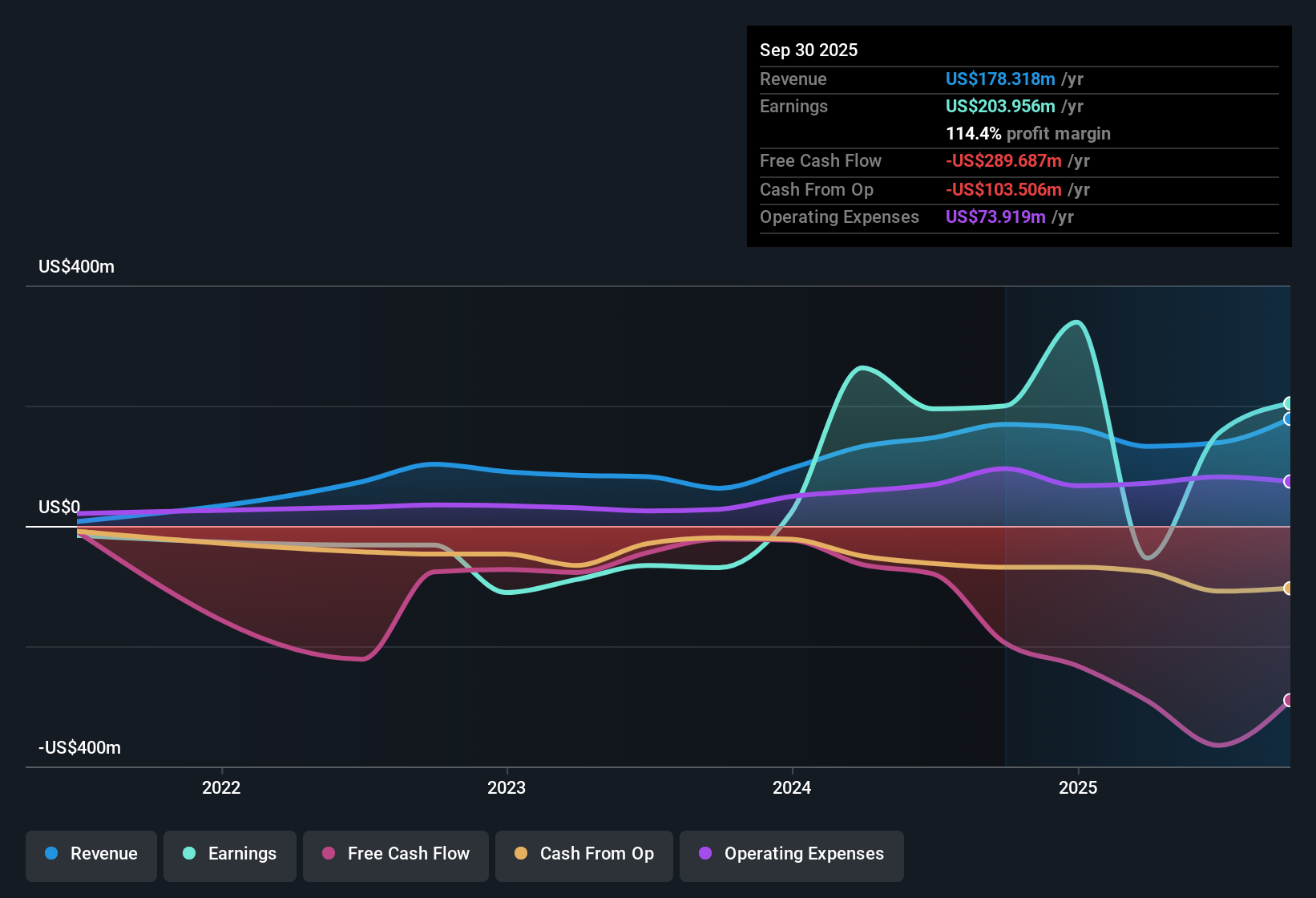- United States
- /
- Software
- /
- NasdaqGS:HUT
We Think You Should Be Aware Of Some Concerning Factors In Hut 8's (NASDAQ:HUT) Earnings
The market shrugged off Hut 8 Corp.'s (NASDAQ:HUT) solid earnings report. We did some digging and believe investors may be worried about some underlying factors in the report.

Examining Cashflow Against Hut 8's Earnings
In high finance, the key ratio used to measure how well a company converts reported profits into free cash flow (FCF) is the accrual ratio (from cashflow). The accrual ratio subtracts the FCF from the profit for a given period, and divides the result by the average operating assets of the company over that time. The ratio shows us how much a company's profit exceeds its FCF.
Therefore, it's actually considered a good thing when a company has a negative accrual ratio, but a bad thing if its accrual ratio is positive. That is not intended to imply we should worry about a positive accrual ratio, but it's worth noting where the accrual ratio is rather high. To quote a 2014 paper by Lewellen and Resutek, "firms with higher accruals tend to be less profitable in the future".
Over the twelve months to September 2025, Hut 8 recorded an accrual ratio of 0.34. Unfortunately, that means its free cash flow was a lot less than its statutory profit, which makes us doubt the utility of profit as a guide. Over the last year it actually had negative free cash flow of US$290m, in contrast to the aforementioned profit of US$204.0m. We also note that Hut 8's free cash flow was actually negative last year as well, so we could understand if shareholders were bothered by its outflow of US$290m. Notably, the company has issued new shares, thus diluting existing shareholders and reducing their share of future earnings.
That might leave you wondering what analysts are forecasting in terms of future profitability. Luckily, you can click here to see an interactive graph depicting future profitability, based on their estimates.
To understand the value of a company's earnings growth, it is imperative to consider any dilution of shareholders' interests. As it happens, Hut 8 issued 16% more new shares over the last year. As a result, its net income is now split between a greater number of shares. To celebrate net income while ignoring dilution is like rejoicing because you have a single slice of a larger pizza, but ignoring the fact that the pizza is now cut into many more slices. Check out Hut 8's historical EPS growth by clicking on this link.
How Is Dilution Impacting Hut 8's Earnings Per Share (EPS)?
Three years ago, Hut 8 lost money. The good news is that profit was up 2.2% in the last twelve months. But earnings per share are actually down 17%, over that same period. This is a great example of why it's rather imprudent to rely only on net income as a growth measure. So you can see that the dilution has had a bit of an impact on shareholders.
In the long term, if Hut 8's earnings per share can increase, then the share price should too. But on the other hand, we'd be far less excited to learn profit (but not EPS) was improving. For the ordinary retail shareholder, EPS is a great measure to check your hypothetical "share" of the company's profit.
Our Take On Hut 8's Profit Performance
As it turns out, Hut 8 couldn't match its profit with cashflow and its dilution means that shareholders own less of the company than the did before (unless they bought more shares). Considering all this we'd argue Hut 8's profits probably give an overly generous impression of its sustainable level of profitability. Keep in mind, when it comes to analysing a stock it's worth noting the risks involved. To that end, you should learn about the 4 warning signs we've spotted with Hut 8 (including 2 which can't be ignored).
In this article we've looked at a number of factors that can impair the utility of profit numbers, and we've come away cautious. But there are plenty of other ways to inform your opinion of a company. Some people consider a high return on equity to be a good sign of a quality business. While it might take a little research on your behalf, you may find this free collection of companies boasting high return on equity, or this list of stocks with significant insider holdings to be useful.
Valuation is complex, but we're here to simplify it.
Discover if Hut 8 might be undervalued or overvalued with our detailed analysis, featuring fair value estimates, potential risks, dividends, insider trades, and its financial condition.
Access Free AnalysisHave feedback on this article? Concerned about the content? Get in touch with us directly. Alternatively, email editorial-team (at) simplywallst.com.
This article by Simply Wall St is general in nature. We provide commentary based on historical data and analyst forecasts only using an unbiased methodology and our articles are not intended to be financial advice. It does not constitute a recommendation to buy or sell any stock, and does not take account of your objectives, or your financial situation. We aim to bring you long-term focused analysis driven by fundamental data. Note that our analysis may not factor in the latest price-sensitive company announcements or qualitative material. Simply Wall St has no position in any stocks mentioned.
About NasdaqGS:HUT
Hut 8
Operates as a vertically integrated operator of energy infrastructure and Bitcoin miners in North America.
Slight risk with limited growth.
Similar Companies
Market Insights
Community Narratives



